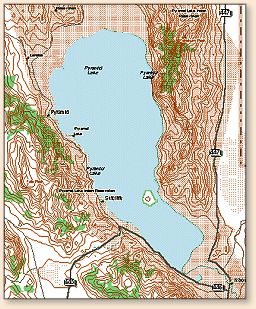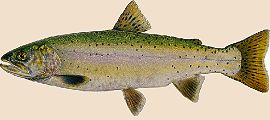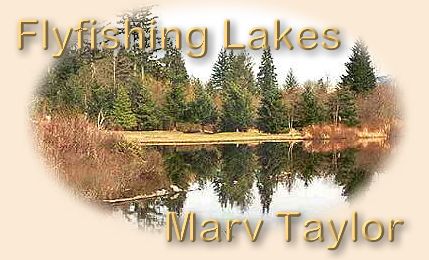|
The next two or three months is the time of
year many fly fishermen choose to sit at their
tying tables, with space-heaters at their feet,
tying flies, waiting for warmer weather to tease
them back to the lake or stream. Others jet to
world class fishing holes in Central and South
America, New Zealand, Tasmania, Christmas Island,
or the Bahamas.
I've been mentally planning trips to these exotic
fishing holes for years. I have just one little
problem: An unsympathetic company treasurer. Vina
seems to think mundane things like new carpeting
and a paint job on the house, takes precedent over
the head of R & D catching reel-smoking bonefish
on a January trip to Christmas Island.

Oh, she does dispense mid-winter fishing perks. The
only problem...the money she is willing to allocate
to such projects, gets me only about as far south
as Reno, Nevada.
While my jet-setting friends are sipping cocktails
on the veranda of some South American lodge, wiping
their brows after a day of battling five and 10
pound German Browns in 90-degree air temperatures,
I'm waist deep in Pyramid Lake, breaking ice out
of my guides.
If I'm lucky, I'll hook enough four or five pound
Lahontan Cutthroat to keep the old bones warm.
I might even hook a larger trout than anything my
friends catch on their world-wide fishing expeditions.
But...I'll still be freezing my butt off, while
they're using sunscreen by the gallon.

While I've been fishing Pyramid Lake off and on
nearly 35 years, I've yet to hook into any real
tackle busters. Several fishing companions have
caught cutthroats up to 15-pounds. That's the beauty
of the place; As slow as the fishing might be, on
any given cast an angler can conceivably hook the
fish of a lifetime.
Several years ago, I and three other Boise fly
fishermen spent three days in late January, fishing
Pyramid. The fishing was terrible. I think we had
hooked only three fish by the end of the second day.
I was ready to head home, but was voted down and we
spent the third day on the lake. Just as the sun
was sinking behind the Virginia Mountains - after a
fishless day - one of our party hooked and landed an
11 ½ pound cutthroat. He considered it the end of a
"beautiful trip." Since I had only caught one 24-inch
fish in three days, I considered it only a somewhat
"merciful ending" to a trip that should never have
been scheduled in the first place (the reports had
been poor, but we rationalized we would enjoy ourselves
in the casinos and great restaurants of Sparks and
Reno, even if the fishing wasn't up to par).
 As a sport fishery, Pyramid Lake has had its ups and
downs over the years. During the '20s, the lake
produced Lahontan cutthroat up to more than 40 pounds.
The world record cutthroat came from the lake. Caught
by John Skimmerhorn, a Paiute Indian, the fish weighted
41 pounds. Some old newspaper clippings suggest there
were actually cutts in the 50- and 60-pound range in
the lake at that time.
As a sport fishery, Pyramid Lake has had its ups and
downs over the years. During the '20s, the lake
produced Lahontan cutthroat up to more than 40 pounds.
The world record cutthroat came from the lake. Caught
by John Skimmerhorn, a Paiute Indian, the fish weighted
41 pounds. Some old newspaper clippings suggest there
were actually cutts in the 50- and 60-pound range in
the lake at that time.
But even as the lake was producing these giant fish,
their death knell was ringing. The fishery was
doomed by commercial overfishing, and worst of
all, by the building of irrigation diversion
dams that reduced the flow of the Truckee River
so drastically that the great fish could not
navigate the river. By the 1940s nobody wasted
time fishing at Pyramid.
Although many authorities thought the shrinking
lake had become too alkaline to support trout
life, in 1948 biologists discovered otherwise.
Stocking began and by 1960, some 10-pounders
were showing up. During the early '70s, the
average weight of cutthroats in the lake was
six pounds, and anglers caught lots of fish
over 10 pounds. Between 1973 and 1978, at
least a dozen fish weighing more than 20 pounds
were reported. Many authorities believe that was
merely the tip of the ice berg so far as large
fish were concerned.
While fishing conditions in recent years have
often been less than perfect, mostly due to
drought conditions, excellent management
strategies on the river and at the lake seem
to guarantee Pyramid will remain one of the top
trophy trout fisheries in the nation for years
to come.
SOME TIPS FOR FISHING PYRAMID LAKE
Fish the lake from now until the first of June
(with the prime months March and April). After
the water begins to warm, the fish will go deep
and become unavailable for shore fishermen. The
lake is closed for trout fishing during July,
August, and September.
While some float tubing does occur on the lake,
most knowledgeable Pyramid Lake fly fishermen
prefer to wade the shoreline and cast. The big
trout roam close to shore in their search for
food. Windy, nasty, tough-to-fish days, seem
to produce the best results.
Most shore fishermen use metal milk cartons or
kitchen stepladders, on which they stand in order
to get more height, therefore more distance to
their casts; And be able to fish in deeper water,
further from shore (a note of caution: anglers
using milk cartons or any other device to stand
on, must occupy them at all times. If you leave
them unattended, you might be cited for littering).
The angling theory at Pyramid is to let the fish
come to you. I still prefer using a float tube or
pontoon boat. Just casting from one spot hour
after hour after hour, gets a little boring...unless,
of course, you are catching a lot of fish.
Since one of the keys to catching fish is to "scratch
the bottom" with your flies, most anglers use
hi-density shooting heads or tapers. While rods
from 6-weight to 8-weight can be effective in fly
presentation, if the wind is blowing - and it
mostly is at the big lake - the heavier 9- and 10-weight
rods are usually more appropriate.
Choosing a successful fly pattern is not an especially
sophisticated endeavor at Pyramid Lake. When I first
began fishing the big lake, in the late '60s, most
of the experts I've talked with, used a size 4 through
8 black or purple Woolly Worm (or bugger) on the
point, and a white Woolly Worm as a dropper. I've
had good luck with the old dependable
Stayner Ducktail .
Pyramid Lake lies 30 miles northeast of Reno, on
State Highway 33. Managed by the Pyramid Lake
Paiute Tribe, the angler will need an Indian
fishing license to fish the lake. Current fees
are $7.00 per day, $50.00 for the season. Licenses
may be purchased at the Pyramid Lake Marina, in the
town of Sutcliffe, on the west side of the lake; or
at the tribal headquarters.
Fishermen can also obtain a map of the lake from
the license vendor. The various beaches and bays
are marked on the map. Some of my favorite spots
include: Dago Bay on the southeast corner of the
lake; Popcorn Beach where the river enters the
lake; near the Sutcliffe fish pens (you cannot
fish within a 1,000 foot radius around the fish
attraction channel); and Pelican Point on the
west side.
For more information, phone the Pyramid Lake Marina,
(702) 574-1000; or write the Marina at 2500 Lakeview
Drive, Sutcliffe, Nevada 89510. The marina has a
laundry, showers, restrooms, boat ramp, and 44 full
RV hookups.
Crosby Lodge operates a small motel and campground
at Sutcliffe. For information, phone (702) 476-0400.
~ Marv
About Marv
Marv Taylor's books, Float-Tubing The West,
The Successful Angler's Journal,
More Fragments of the Puzzle, (Volume I) and More
Fragments of the Puzzle, (Volume II) are all available from
Marv. You can reach Marv by email at
marvtroutman@juno.com or by phone: 208-322-5760.
|





 As a sport fishery, Pyramid Lake has had its ups and
downs over the years. During the '20s, the lake
produced Lahontan cutthroat up to more than 40 pounds.
The world record cutthroat came from the lake. Caught
by John Skimmerhorn, a Paiute Indian, the fish weighted
41 pounds. Some old newspaper clippings suggest there
were actually cutts in the 50- and 60-pound range in
the lake at that time.
As a sport fishery, Pyramid Lake has had its ups and
downs over the years. During the '20s, the lake
produced Lahontan cutthroat up to more than 40 pounds.
The world record cutthroat came from the lake. Caught
by John Skimmerhorn, a Paiute Indian, the fish weighted
41 pounds. Some old newspaper clippings suggest there
were actually cutts in the 50- and 60-pound range in
the lake at that time.